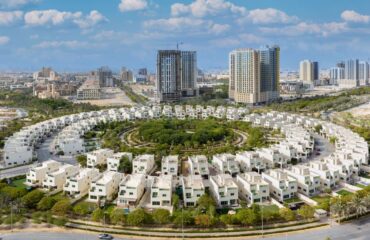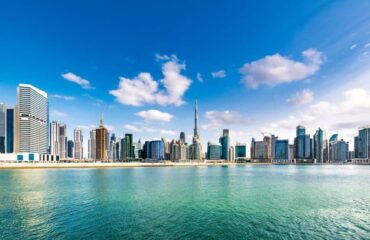
The short answer is yes, expats can buy property in UAE. In fact, the UAE has become one of the most welcoming real estate markets for foreign investors and expatriates. With freehold ownership rights, attractive residency visa options, and a transparent legal framework, the UAE offers incredible opportunities for expats looking to invest in property.
Did you know that Dubai alone recorded over AED 522.1 billion worth of property transactions in 2024? This impressive figure reflects not just the city’s booming market but also the trust that international investors place in the UAE’s real estate sector.
In this blog, we’ll guide you through everything you need to know about buying property in UAE for expats—from legal requirements and ownership rules to region-specific insights and step-by-step buying processes. Let’s dive in and help you turn your dream of owning property in the UAE into reality.
Highlights
- Why does the UAE real estate market attract foreigners?
- What do expats need to know about the Emirati real estate market?
- Conditions for owning Emirati real estate for expats
- Specifics of real estate transactions in different emirates
- How to conclude a property contract in Dubai?
- How to conclude a property contract in Abu Dhabi?
- How to conclude a contract in Sharjah?
- Grovy – your trusted real estate partner in the UAE
- Final thoughts – can expats buy property in UAE?
- FAQs about buying property in UAE for expats
Why does the UAE real estate market attract foreigners?
The UAE has become one of the world’s most desirable destinations for property investment, drawing interest from expatriates, international investors, and retirees alike. But what makes the UAE real estate market so appealing? Below are the key reasons why buying property in UAE for expats remains a popular choice.
1. Tax benefits
One of the most significant advantages of investing in UAE real estate is the absence of property taxes. Property owners are not required to pay annual property taxes, inheritance taxes, or capital gains taxes on sales. This tax-free environment makes property ownership highly appealing to both investors and long-term residents.
2. Attractive residency visa options
Expats who purchase property above a certain value in the UAE can qualify for long-term residency visas, such as the Golden Visa or the 2-year investor visa. These visas provide security and stability, allowing expats to build their future in the UAE without worrying about residency renewals tied to employment contracts.
3. High rental yields
The UAE, particularly cities like Dubai and Abu Dhabi, offers some of the highest rental yields globally, averaging between 6% and 8%. This makes property investment an attractive option for those looking to earn passive income.
4. Strategic location and global connectivity
The UAE serves as a global hub, connecting Europe, Asia, and Africa. With world-class airports, seaports, and infrastructure, the country is perfectly positioned for international business and travel. Owning property in such a strategically located market adds immense value to expat investments.
5. World-class infrastructure and lifestyle
From state-of-the-art residential developments and luxury villas to smart city projects and green communities, the UAE offers properties designed to meet global standards. Residents enjoy access to top-tier healthcare, education, entertainment, and leisure facilities, creating an exceptional quality of life.
6. Transparent legal framework
The UAE has established a clear legal framework to protect property buyers and investors. With regulations enforced by bodies like the Dubai Land Department (DLD) and Abu Dhabi Municipality, the property buying process is transparent and secure.
7. Stable economy and investor confidence
The UAE has consistently demonstrated economic resilience and stability, even during global financial challenges. With government-led initiatives to diversify the economy, investor confidence in the real estate market remains strong.
8. Diverse property options
The UAE offers a wide variety of properties to suit every budget and lifestyle. From luxurious penthouses overlooking the Dubai skyline to family-friendly villas in suburban communities, there’s something for everyone.
A market designed for expat success
Whether you’re planning to live in the UAE long-term, earn rental income, or simply diversify your investment portfolio, buying property in UAE for expats offers both financial and lifestyle benefits.
In the next section, we’ll discuss what expats need to know about the UAE real estate market, including ownership types, legal requirements, and common property options.
What do expats need to know about the Emirati real estate market?
For expats considering buying property in UAE, understanding the basics of the real estate market is essential. The UAE offers a well-regulated and investor-friendly property landscape, but there are key factors every expat should be aware of before making a decision.
1. Freehold vs leasehold properties
In the UAE, expats can buy property under two main ownership categories:
- Freehold properties: Expats and foreigners can have full ownership of freehold properties, including the land on which they are built. These properties are typically located in designated freehold zones, such as Dubai Marina, Palm Jumeirah, and Yas Island in Abu Dhabi.
- Leasehold properties: These are properties that expats can lease for a long-term period, usually up to 99 years. Leasehold agreements don’t grant ownership of the land, only the right to use the property for the lease term.
Understanding this distinction is key to making an informed investment decision.
2. Legal regulations for expat property ownership
The UAE has clear property laws that govern foreign ownership. Each emirate has its own regulations:
- In Dubai, expats can own freehold property in designated zones.
- In Abu Dhabi, foreigners can own leasehold properties or freehold properties in selected investment zones.
- In Sharjah, expats are primarily restricted to leasehold properties for a maximum of 100 years.
It’s important to check the specific regulations of the emirate where you plan to invest.
3. Popular property types
Expats have a variety of property options to choose from, including:
- Apartments: Popular in areas like Dubai Marina, Jumeirah Village Circle (JVC), and Downtown Dubai.
- Villas: Ideal for families, with popular communities like Arabian Ranches, Palm Jumeirah, and Al Raha Gardens in Abu Dhabi.
- Townhouses: A balance between apartments and villas, offering spacious layouts with community living benefits.
4. Mortgage options for expats
Expats in the UAE can apply for property mortgages, but they must meet certain requirements:
- A minimum 20–25% down payment is usually required.
- Mortgage eligibility depends on income, employment stability, and credit history.
- UAE banks typically offer competitive mortgage rates for expats.
5. Service charges and maintenance fees
Property owners in the UAE must pay annual service charges for the maintenance and upkeep of common areas and facilities. These fees vary depending on the community and property type.
6. Work with trusted real estate developers and agents
Choosing a reputable developer or real estate agent ensures a smooth buying process. Developers like Grovy have built a reputation for delivering high-quality properties designed for modern living.
7. Understand your rights as a buyer
Expats are protected by UAE property laws, which include safeguards like escrow accounts for off-plan properties and regulations enforced by authorities like the Dubai Land Department (DLD).
Knowledge is power in property investment
For expats, buying property in UAE offers financial benefits, residency opportunities, and a chance to own a home in one of the world’s most exciting cities. However, understanding the local rules, ownership types, and financial commitments is essential to making a confident decision.
In the next section, we’ll explore the conditions for owning Emirati real estate for expats, including eligibility requirements and important factors to keep in mind.
Conditions for owning Emirati real estate for expats
For expatriates exploring buying property in UAE for expats, understanding the conditions tied to ownership is essential. While the UAE is known for its transparent property laws and welcoming approach to foreign buyers, there are specific requirements that vary based on the emirate and type of property. Here are the key factors you need to consider that we haven’t already covered.
1. Approved property zones for expats
While freehold ownership is available in many emirates, it’s restricted to specific zones. These areas are approved by local authorities and typically include popular locations like Dubai Marina, Palm Jumeirah, Saadiyat Island, and Al Reem Island.
Before making a purchase, ensure the property is in an expat-approved zone to avoid legal complications.
2. Off-plan property purchase protections
When buying an off-plan property in the UAE, expats must ensure:
- Payments are protected through escrow accounts mandated by law.
- Developers are registered with the relevant emirate’s property authority.
- Contracts include clear completion dates and penalty clauses for delays.
These measures ensure financial security and reduce investment risks.
3. Ownership documentation requirements
Expats purchasing property in the UAE must prepare specific documents, including:
- A valid passport copy.
- Proof of income (salary certificates or bank statements).
- Residency visa (in certain cases).
Having these documents ready can speed up the property purchase process.
4. Property ownership transfer process
The property transfer process typically involves:
- Signing a Memorandum of Understanding (MoU) with the seller.
- Paying a deposit, often 10% of the property value.
- Completing the property registration with the relevant land authority.
Each emirate may have slight variations in the transfer process, so it’s best to consult local experts.
5. Leasehold property clauses
For leasehold properties, expats must pay close attention to:
- The lease term (typically 99 years).
- Renewal conditions at the end of the lease period.
- Terms around property maintenance and handover obligations.
Leasehold agreements are legally binding, and understanding the fine print ensures clarity for both parties.
6. Investor visa application (if applicable)
While visas tied to property ownership have been discussed earlier, the application process often requires:
- Proof of property ownership (Title Deed).
- Minimum property value requirements met.
- Clearances from relevant authorities.
Understanding the step-by-step process can make securing an investor visa smoother.
7. Post-purchase responsibilities
After purchasing property, expats should:
- Register with the relevant utility providers.
- Familiarise themselves with community rules and service charge structures.
- Ensure regular updates on legal or regulatory changes that may impact ownership.
These responsibilities often go unnoticed but are crucial for hassle-free property ownership.
8. Understanding inheritance laws
In the UAE, inheritance laws differ from many other countries. Expats are advised to:
- Draft a will in accordance with UAE laws if they wish to secure property inheritance.
- Consult a legal advisor to understand the implications of inheritance laws for their property.
This precaution ensures clarity and avoids complications for heirs.
While the UAE makes property ownership accessible for expatriates, the details often vary based on the emirate and property type. Being informed about these conditions ensures a smoother buying experience and protects your investment in the long run.
Next, we’ll take a closer look at the specifics of real estate transactions in different emirates, starting with Dubai.
Specifics of real estate transactions in different emirates
When it comes to buying property in UAE for expats, each emirate operates under its own set of regulations and procedures. While the overall legal framework is consistent across the UAE, there are unique aspects to consider in each region. Below, we’ll break down the key specifics for property transactions in Dubai, Abu Dhabi, and Sharjah.
Buying property in Dubai
Dubai remains the most popular choice for expats investing in UAE real estate. Known for its transparent property laws and investor-friendly approach, the city offers freehold ownership in designated areas.
Key highlights for buying property in Dubai:
- Freehold zones: Popular areas include Dubai Marina, Palm Jumeirah, Downtown Dubai, and Dubai Creek Harbour.
- Legal authority: Transactions are regulated by the Dubai Land Department (DLD).
- Sales agreement: The process begins with signing a Memorandum of Understanding (MoU), followed by a deposit payment (usually 10% of the property value).
- Transfer of ownership: The transaction is completed at the DLD office, where the buyer and seller finalise the ownership transfer.
- Additional costs: Buyers pay 4% DLD registration fees and agency commissions (around 2%).
Pro tip: Always verify the developer’s credentials and ensure payments for off-plan properties go into an escrow account to protect your investment.
Buying property in Abu Dhabi
Abu Dhabi offers a mix of freehold and leasehold ownership options for expats, depending on the property’s location.
Key highlights for buying property in Abu Dhabi:
- Freehold zones: Expats can buy property in areas like Yas Island, Saadiyat Island, Al Reem Island, and Al Raha Beach.
- Legal authority: The Department of Municipalities and Transport (DMT) oversees property transactions.
- Ownership types: Expats can own freehold property in designated zones or leasehold property in other areas for up to 99 years.
- Transfer process: Property transactions are completed through the Abu Dhabi Municipality, ensuring legal transparency.
- Additional costs: Buyers typically pay 2% of the property value as registration fees.
Pro tip: Off-plan properties in Abu Dhabi often come with flexible payment plans. Ensure the payment structure aligns with your financial goals.
Buying property in Sharjah
Sharjah is a growing hub for expat property investments, offering more affordable options compared to Dubai and Abu Dhabi. However, property ownership for expats is primarily limited to leasehold agreements.
Key highlights for buying property in Sharjah:
- Ownership type: Expats can only purchase leasehold properties for a period of up to 100 years.
- Legal authority: Transactions are managed by the Sharjah Real Estate Registration Department (SRERD).
- Designated zones: Leasehold properties are available in areas like Aljada, Tilal City, and Maryam Island.
- Sales agreements: Lease agreements must be registered with the Sharjah Municipality.
- Additional costs: Buyers may face registration fees of around 2% to 4% of the property value.
Pro tip: Ensure that leasehold contracts clearly outline renewal terms and maintenance responsibilities.
Key differences across the Emirates
| Aspect | Dubai | Abu Dhabi | Sharjah |
| Ownership Type | Freehold & Leasehold | Freehold & Leasehold | Leasehold only |
| Authority | Dubai Land Department | Department of Municipalities and Transport | Sharjah Real Estate Registration Department |
| Zones | Designated freehold areas | Investment zones like Yas Island | Limited to leasehold zones |
| Registration Fees | 4% of property value | 2% of property value | 2%–4% of property value |
While the UAE offers expats the opportunity to own property, each emirate has its unique regulations and transaction processes. Whether you’re eyeing the vibrant lifestyle of Dubai, the cultural charm of Abu Dhabi, or the affordability of Sharjah, understanding these differences is key to a smooth buying experience.
In the next section, we’ll break down the step-by-step process of how to conclude a property contract in Dubai specifically.
How to conclude a property contract in Dubai?
Concluding a property contract in Dubai follows a structured and transparent process, making it straightforward for expats. Here are the key steps:
- Sign a Memorandum of Understanding (MoU):
- Outline the terms and conditions with the seller.
- Pay a 10% deposit to secure the property.
- Obtain a No Objection Certificate (NOC):
- The seller must secure an NOC from the property developer.
- Mortgage approval (if applicable):
- Ensure your bank pre-approves your mortgage and completes the property valuation.
- Transfer ownership at the Dubai Land Department (DLD):
- Submit required documents (passport copies, MoU, NOC, mortgage letter).
- Pay the 4% DLD registration fee.
- Receive the Title Deed:
- Once the ownership transfer is completed, you’ll receive the official Title Deed.
Quick tips:
- Work with a RERA-registered agent for guidance.
- Avoid cash payments; use secure channels approved by the DLD.
- Carefully review all terms before signing agreements.
Dubai’s property transaction process is efficient and transparent, offering expats a secure path to ownership.
Next, we’ll briefly cover how to conclude a property contract in Abu Dhabi and highlight key differences.
How to conclude a property contract in Abu Dhabi?
The process of buying property in UAE for expats in Abu Dhabi is well-regulated and slightly differs from Dubai. Here’s a quick overview of the key steps:
- Sign the sales agreement:
- Agree on the terms and conditions with the seller.
- Pay a deposit (usually 5–10%) to secure the property.
- Obtain a No Objection Certificate (NOC):
- The seller must secure an NOC from the developer to ensure there are no outstanding payments.
- Mortgage approval (if applicable):
- Secure mortgage pre-approval from a UAE bank.
- Ensure the property is valued and mortgage terms are finalised.
- Ownership transfer at the Department of Municipalities and Transport (DMT):
- Submit the required documents (passport, sales agreement, NOC).
- Pay the 2% registration fee to finalise the transaction.
- Receive the title deed:
- Once the process is complete, you’ll receive your Title Deed, officially recognising your ownership.
Quick tips:
- Double-check whether the property is freehold or leasehold.
- Work with registered agents and trusted legal advisors.
- Ensure all agreements are legally documented and notarised.
Next, we’ll briefly explain how to conclude a property contract in Sharjah, focusing on its unique conditions.
How to conclude a contract in Sharjah?
When it comes to buying property in UAE for expats in Sharjah, the process differs slightly from Dubai and Abu Dhabi due to its leasehold ownership structure. Here’s a simplified breakdown of the key steps:
- Sign the sales agreement:
- Agree on terms with the seller and sign a leasehold sales contract.
- Pay an initial deposit (typically 10%) to secure the property.
- Obtain approval from the Sharjah Real Estate Registration Department (SRERD):
- The seller must secure approval from SRERD to proceed with the transaction.
- Lease registration:
- Both buyer and seller must visit the Sharjah Real Estate Registration Department to finalise the leasehold agreement.
- Pay registration fees (usually 2%–4% of the property value).
- Transfer of ownership:
- Submit all required documents (passport copies, sales agreement, proof of payment).
- Complete the lease transfer process and receive official ownership documentation.
- Understand lease terms:
- Carefully review lease terms, including duration (up to 100 years) and renewal conditions.
Quick tips:
- Verify the leasehold property terms with the developer and SRERD.
- Understand long-term maintenance responsibilities.
- Ensure all documents are officially registered.
Sharjah offers a unique blend of affordability and cultural charm, making it a great option for expats seeking stable leasehold investments.
In the next section, we’ll introduce Grovy Real Estate and how their projects support expats in finding their ideal property in the UAE.
Grovy – your trusted real estate partner in the UAE
When it comes to buying property in UAE for expats, having a reliable real estate developer makes all the difference. At Grovy Real Estate, we specialise in crafting modern, thoughtfully designed homes that cater to the unique needs of expatriates and investors.
Where are Grovy’s properties located?
Our developments are strategically located in some of Dubai’s most sought-after areas:
- Jumeirah Village Circle (JVC): Known for its family-friendly vibe, green spaces, and excellent community facilities.
- Dubai Islands: Offering waterfront living with stunning views and top-tier amenities.
Each Grovy project is built with quality, comfort, and long-term value in mind, ensuring your investment is both secure and rewarding.
Why choose Grovy?
- Commitment to excellence: Every project reflects our dedication to quality construction and modern design.
- Customer-centric approach: We guide our clients through every step of the buying process, offering transparency and support.
- Focus on lifestyle: Our properties are more than just homes—they’re spaces designed for well-being and connection.
Whether you’re an expat looking for a family home or an investor seeking strong rental returns, Grovy Real Estate provides a seamless experience tailored to your goals.
Final thoughts – can expats buy property in UAE?
The answer to can expats buy property in UAE is a clear yes. With freehold zones, strong legal protections, and attractive residency visa options, the UAE offers expats a secure path to property ownership.
For short-term residents, renting may be practical, but for long-term plans, buying property in UAE for expats provides financial security and long-term value.
At Grovy, we offer modern homes in prime locations like Jumeirah Village Circle (JVC) and Dubai Islands, ensuring every buyer finds the perfect property.
Start your property journey with Grovy today.
FAQs about buying property in UAE for expats
1. Can expats buy property in UAE?
Yes, expats can buy freehold or leasehold properties in designated zones across the UAE.
2. Is buying property in UAE for expats a good investment?
Absolutely. With high rental yields and strong market performance, property investment in the UAE offers excellent returns.
3. Can foreigners buy property in UAE without residency?
Yes, foreigners can buy property in freehold zones without holding UAE residency.
4. Are there additional costs when buying property in UAE?
Yes, expect costs like registration fees (4% in Dubai), agency commissions, and annual service charges.
5. Can buying property in UAE get you a visa?
Yes, properties worth AED 750,000 qualify for a 3-year visa, and properties worth AED 2 million qualify for a 10-year Golden Visa.
6. Is it better to rent or buy property in UAE?
For short-term stays, renting is more practical. For long-term plans, buying offers better financial benefits.
7. Do I need a mortgage pre-approval to buy property in UAE?
If you’re financing your purchase, mortgage pre-approval is highly recommended for a smoother process.
8. Are property laws different across emirates?
Yes, each emirate has specific regulations, so it’s important to understand local laws before buying.








